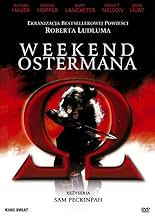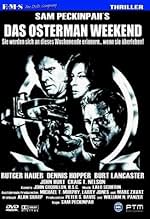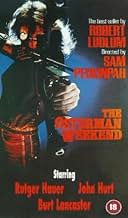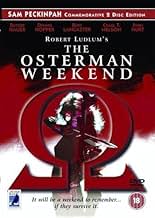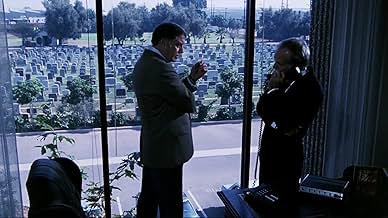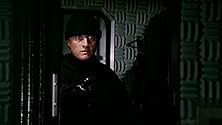IMDb RATING
5.8/10
9.8K
YOUR RATING
During the Cold War, a controversial television journalist is asked by the C.I.A. to persuade certain acquaintances, who are Soviet Agents of the Omega network, to defect.During the Cold War, a controversial television journalist is asked by the C.I.A. to persuade certain acquaintances, who are Soviet Agents of the Omega network, to defect.During the Cold War, a controversial television journalist is asked by the C.I.A. to persuade certain acquaintances, who are Soviet Agents of the Omega network, to defect.
- Director
- Writers
- Stars
- Awards
- 2 wins total
- Director
- Writers
- All cast & crew
- Production, box office & more at IMDbPro
Featured reviews
Action movie in Peckinpah style with tension , intrigue , thrills , gushing blood and violence . The one weekend of the year you won't want to miss. The host of an investigative news spectacle (Rutger Hauer,first major character in a Hollywood movie played by Dutch actor) is assigned a dangerous mission As TV show hosted by television journalist John Tanner is called "Face to Face" and he is convinced by a CIA operative (John Hurt was second billed) that the friends (Chris Sarandon , Dennis Hooper , Craig T Nelson) and wives (Helen Shaver ,Cassie Yates) he has invited to a weekend party are Russian spies from a secret organization . The name of the Soviet spy network was "Omega".
This actioner and suspenseful movie tells a convoluted and complicated tale of vendetta , espionage and treason . Interesting but slightly boring spy film , including an overly complex and confusing script , even though at times it is admittedly engrossing . The picture was made and released about eleven years after its source novel of the same name by Robert Ludlum had been first published in 1972 . Sam Peckinpah was fired as director during post-production. Others were Convoy and Ride the High County . When he refused to re-edit Osterman weekend after it was screened for a test audience and met with a confused and extremely mixed reaction. Producers took over the editing with the assistance of the editor , drastically altering opening and ending sequences. Mediocre and dark cinematography by John Coquillon , in fact , the picture involved a considerable amount of filming at night. It was filmed at a 1950s ranch located in upper Mandeville Canyon in the Hollywood Hills , it was a property once owned by Robert Taylor and has been frequently been known by the names the "Taylor Estate" . Anti-climatic soundtrack by Lalo Schifrin composed by means by synthesizer . Director Don Siegel, long time friend and mentor to Sam Peckinpah, recommended Lalo Schifrin as the film's composer. Schifrin had scored five of Siegel's movies ; composer Lalo Schifrin had to sit by Sam Peckinpah's sick bed in order to spot the film and decide which scenes did or did not need music.
Final film of director Sam Peckinpah. The picture was also Peckinpah's big "comeback movie", it was his first in five years, his last film having been at the time Convoy back in 1978 . The movie is also Peckinpah's only feature film of the 1980s decade . The production shoot for this film ran for fifty-four days . Director Sam Peckinpah was in ill-health throughout the shoot as the long-term toll of his drug and alcohol abuse suggested to many in the production that he was dying. Peckinpah after beginning as a writer , was soon involved in TV Westerns at the peak of his popularity ; shooting series just like ¨¨The Westener¨, ¨Gunsmoke¨and most popular ¨Rifleman¨, moving into films by 1961 when he made nice impression with ¨The deadly companions¨, ¨Ride the High Country¨ , Major Dundee¨ and his best picture ,Wild Bunch¨ . After that , he concentrated on nail-biting and tougher-than-tough action films just like ¨The getaway¨, ¨Convoy¨, ¨the ¨killer elite¨ and this last movie ¨Osterman weekend¨ . The final title as violent and nice as anyone the Western or wartime genre has given us .
This actioner and suspenseful movie tells a convoluted and complicated tale of vendetta , espionage and treason . Interesting but slightly boring spy film , including an overly complex and confusing script , even though at times it is admittedly engrossing . The picture was made and released about eleven years after its source novel of the same name by Robert Ludlum had been first published in 1972 . Sam Peckinpah was fired as director during post-production. Others were Convoy and Ride the High County . When he refused to re-edit Osterman weekend after it was screened for a test audience and met with a confused and extremely mixed reaction. Producers took over the editing with the assistance of the editor , drastically altering opening and ending sequences. Mediocre and dark cinematography by John Coquillon , in fact , the picture involved a considerable amount of filming at night. It was filmed at a 1950s ranch located in upper Mandeville Canyon in the Hollywood Hills , it was a property once owned by Robert Taylor and has been frequently been known by the names the "Taylor Estate" . Anti-climatic soundtrack by Lalo Schifrin composed by means by synthesizer . Director Don Siegel, long time friend and mentor to Sam Peckinpah, recommended Lalo Schifrin as the film's composer. Schifrin had scored five of Siegel's movies ; composer Lalo Schifrin had to sit by Sam Peckinpah's sick bed in order to spot the film and decide which scenes did or did not need music.
Final film of director Sam Peckinpah. The picture was also Peckinpah's big "comeback movie", it was his first in five years, his last film having been at the time Convoy back in 1978 . The movie is also Peckinpah's only feature film of the 1980s decade . The production shoot for this film ran for fifty-four days . Director Sam Peckinpah was in ill-health throughout the shoot as the long-term toll of his drug and alcohol abuse suggested to many in the production that he was dying. Peckinpah after beginning as a writer , was soon involved in TV Westerns at the peak of his popularity ; shooting series just like ¨¨The Westener¨, ¨Gunsmoke¨and most popular ¨Rifleman¨, moving into films by 1961 when he made nice impression with ¨The deadly companions¨, ¨Ride the High Country¨ , Major Dundee¨ and his best picture ,Wild Bunch¨ . After that , he concentrated on nail-biting and tougher-than-tough action films just like ¨The getaway¨, ¨Convoy¨, ¨the ¨killer elite¨ and this last movie ¨Osterman weekend¨ . The final title as violent and nice as anyone the Western or wartime genre has given us .
John Tanner is a controversial journalist who makes it his business to hold truth to power on his television show, exposing government corruption wherever and whenever he can. As he is preparing for a weekend get together with three of his closest friends at his lavish California estate, Tanner is contacted by a CIA agent named Laurence Fassett. It transpires that Fassett and the agency believe Tanner's friends are part of a Soviet spy network, and they think he can get them to defect. As the weekend rolls on, suspicions become raised on all sides, and- as the lines between truth, fiction, loyalty and betrayal are irrevocably blurred- the question arises: just who is manipulating whom?
Directed by Sam Peckinpah and based on Robert Ludlum's novel of the same name, 'The Osterman Weekend' is a well-acted thriller that rises above its source material, though seems a sad swansong for such a visionary director. Screenwriters Ian Masters and Alan Sharp have injected some much-needed energy and cohesion into Ludlum's convoluted tale, transforming it into a parable about the power of television as a tool of propaganda, instead of the weak meditation on revenge and cold-war paranoia that it originally was.
Unlike in the book, Masters and Sharp use 'The Osterman Weekend' to explore how the media shapes narratives, changes meanings and influences opinions through editing and censorship. Through Tanner's program and the machinations of the CIA, they examine the idea that belief is generated through television- in other words, if people see it on TV, they believe it. While not a particularly profound or original notion, it lends the narrative more weight, as well as providing additional dramatic tension throughout.
This is not to say that 'The Osterman Weekend' should be lauded as a masterpiece, only that it asks more interesting questions than Ludlum's novel, and has a clearer message at its center. Masters and Sharp have not made Ludlum's awkward dialogue any more eloquent, nor has the inclusion of a new character and a new ending helped matters any. The story is still inherently flawed, and bad post-production and editing without Peckinpah's involvement means the finished product is a tad schizophrenic in terms of tone and content- though it is still inarguably easier to follow and more assured than its source material.
'The Osterman Weekend' reunites Peckinpah with cinematographer John Coquillon, whose talents the director had utilized for 'Pat Garrett & Billy the Kid' and 'Straw Dogs'. Coquillon does fine work that fits well within Peckinpah's oeuvre, featuring much of the director's trademark slow-motion violence. By incorporating CCTV footage from multiple monitors, Coquillon shows us different perspectives on events throughout, bolstering Tanner's paranoia and uncertainty about the reality of his situation. Odd angles and lighting are used to heighten this paranoia, though the overall visual aesthetic is one far less stylized than Peckinpah's 'The Wild Bunch', or Coquillon's work on 'Witchfinder General,' adding a sense of authenticity to proceedings.
Also contributing to the sense of paranoia and authenticity are the cast, many of whom deliver nuanced performances that keep audiences unsure of their motivations and loyalties. Rutger Hauer is charismatic and commanding as Tanner, showing a side of his personality he had not yet done through his villainous roles in Hollywood films. Craig T. Nelson does sterling work as Osterman, making him charming, yet morally mysterious. Dennis Hopper fades into the background somewhat, though has some good scenes with Helen Shaver, who is consistently excellent as his drugged-out wife, displaying much emotional perspicuity.
In his case, the great Burt Lancaster seems bored as the director of the CIA, apparently disliking Peckinpah's interpretation of the character and direction. For their parts, Chris Sarandon, Meg Foster and Cassie Yates are competent but generally underused. The real stand-out is John Hurt, who is spellbinding as Fassett, all but stealing the picture. Convincing, conniving and complex, Hurt transforms the one-note caricature of Ludlum's book into the most interesting character in the film, and it's a joy any time he's on screen.
Sam Peckinpah's last film, 'The Osterman Weekend' is far from his best work. Though it is well acted and features fine cinematography, the story leaves a lot to be desired, and post-production work without the involvement of the director leaves the finished product lacking consistency and coherence. Though its indictment of television as a mode of propaganda is still timely, it is not a particularly subtle or profound work in that regard. To conclude, though it has its moments, Bloody Sam deserved a better last hurrah than this.
Directed by Sam Peckinpah and based on Robert Ludlum's novel of the same name, 'The Osterman Weekend' is a well-acted thriller that rises above its source material, though seems a sad swansong for such a visionary director. Screenwriters Ian Masters and Alan Sharp have injected some much-needed energy and cohesion into Ludlum's convoluted tale, transforming it into a parable about the power of television as a tool of propaganda, instead of the weak meditation on revenge and cold-war paranoia that it originally was.
Unlike in the book, Masters and Sharp use 'The Osterman Weekend' to explore how the media shapes narratives, changes meanings and influences opinions through editing and censorship. Through Tanner's program and the machinations of the CIA, they examine the idea that belief is generated through television- in other words, if people see it on TV, they believe it. While not a particularly profound or original notion, it lends the narrative more weight, as well as providing additional dramatic tension throughout.
This is not to say that 'The Osterman Weekend' should be lauded as a masterpiece, only that it asks more interesting questions than Ludlum's novel, and has a clearer message at its center. Masters and Sharp have not made Ludlum's awkward dialogue any more eloquent, nor has the inclusion of a new character and a new ending helped matters any. The story is still inherently flawed, and bad post-production and editing without Peckinpah's involvement means the finished product is a tad schizophrenic in terms of tone and content- though it is still inarguably easier to follow and more assured than its source material.
'The Osterman Weekend' reunites Peckinpah with cinematographer John Coquillon, whose talents the director had utilized for 'Pat Garrett & Billy the Kid' and 'Straw Dogs'. Coquillon does fine work that fits well within Peckinpah's oeuvre, featuring much of the director's trademark slow-motion violence. By incorporating CCTV footage from multiple monitors, Coquillon shows us different perspectives on events throughout, bolstering Tanner's paranoia and uncertainty about the reality of his situation. Odd angles and lighting are used to heighten this paranoia, though the overall visual aesthetic is one far less stylized than Peckinpah's 'The Wild Bunch', or Coquillon's work on 'Witchfinder General,' adding a sense of authenticity to proceedings.
Also contributing to the sense of paranoia and authenticity are the cast, many of whom deliver nuanced performances that keep audiences unsure of their motivations and loyalties. Rutger Hauer is charismatic and commanding as Tanner, showing a side of his personality he had not yet done through his villainous roles in Hollywood films. Craig T. Nelson does sterling work as Osterman, making him charming, yet morally mysterious. Dennis Hopper fades into the background somewhat, though has some good scenes with Helen Shaver, who is consistently excellent as his drugged-out wife, displaying much emotional perspicuity.
In his case, the great Burt Lancaster seems bored as the director of the CIA, apparently disliking Peckinpah's interpretation of the character and direction. For their parts, Chris Sarandon, Meg Foster and Cassie Yates are competent but generally underused. The real stand-out is John Hurt, who is spellbinding as Fassett, all but stealing the picture. Convincing, conniving and complex, Hurt transforms the one-note caricature of Ludlum's book into the most interesting character in the film, and it's a joy any time he's on screen.
Sam Peckinpah's last film, 'The Osterman Weekend' is far from his best work. Though it is well acted and features fine cinematography, the story leaves a lot to be desired, and post-production work without the involvement of the director leaves the finished product lacking consistency and coherence. Though its indictment of television as a mode of propaganda is still timely, it is not a particularly subtle or profound work in that regard. To conclude, though it has its moments, Bloody Sam deserved a better last hurrah than this.
The Robert Ludlum book of the same name is excellent, very tense and very well written. I waited ages for this film to come along at the right price (25p off ebay, ha ha), but how disappointed I was when I finally saw it. Maybe it wouldn't be a bad film if it wasn't based on a book, but it is, and a great book at that. Therefore, I have to compare the film with the original as the two can't be separated. Relative to the book, the film is, frankly, rubbish I'm sorry to say. I had such high expectations, but the film bore such little resemblance to the book that had I not known it was called "The Osterman Weekend", I would never have guessed that it was based on the book of the same name.
I gave this film 5/10 simply because I made it through to the end (and Rutger Hauer and John Hurt have done some great stuff), but it was more out of morbid curiosity as to how much more they could butcher the book than for any entertainment value. This was a film that was a product of its time (replete with cheesy music and bad acting) and it hasn't aged well. I'm glad I bought it for 25p because any more and I would've considered it a waste of money.
If it comes up on TV and you have 90 minutes burning a hole in your life, watch it - it isn't dreadful, but it's certainly not great. If you've read the book and are hoping to see it brought to life, or think that you're about to watch another Sam Peckinpah classic, give it a miss, it really isn't worth it.
I gave this film 5/10 simply because I made it through to the end (and Rutger Hauer and John Hurt have done some great stuff), but it was more out of morbid curiosity as to how much more they could butcher the book than for any entertainment value. This was a film that was a product of its time (replete with cheesy music and bad acting) and it hasn't aged well. I'm glad I bought it for 25p because any more and I would've considered it a waste of money.
If it comes up on TV and you have 90 minutes burning a hole in your life, watch it - it isn't dreadful, but it's certainly not great. If you've read the book and are hoping to see it brought to life, or think that you're about to watch another Sam Peckinpah classic, give it a miss, it really isn't worth it.
"The Osterman Weekend" emits the feeling of a last gasp. What was an author's second novel later took this form of a director's last film. Sam Peckinpah was a good choice for directing, with film's like "The Wild Bunch" and "Pat Garrett and Billy the Kid" under his belt, Peckinpah wouldn't hesitate to show the grim world of betrayal and manipulation that Robert Ludlum showed through virtually everyone of his books. With spy films like the James Bond franchise being the most popular, this was the lesser seem side of that coin - the side that is less escapist adventure storytelling for boys.
However, the problems that Sam Peckinpah was going through at his last stages have noticeably affected the film. The intricate plot is there, but feels stitched together in parts, though that may very well be due the studio demanding re-editing work. The action is at times sloppy with very little of the mesmerizing details of Peckinpah's previous action sequences; a car crash even contains multiple repeats of the same angle and makes some disastrous continuity. The other action scenes are a notch or two better, but still far from what they could have been.
But, at least the plot and its many deceptions keep you guessing, right to the last shot. --- 6/10
BsCDb Classification: 13+ --- violence, sexual content
However, the problems that Sam Peckinpah was going through at his last stages have noticeably affected the film. The intricate plot is there, but feels stitched together in parts, though that may very well be due the studio demanding re-editing work. The action is at times sloppy with very little of the mesmerizing details of Peckinpah's previous action sequences; a car crash even contains multiple repeats of the same angle and makes some disastrous continuity. The other action scenes are a notch or two better, but still far from what they could have been.
But, at least the plot and its many deceptions keep you guessing, right to the last shot. --- 6/10
BsCDb Classification: 13+ --- violence, sexual content
Sam Peckinpah is one of my favorite directors. I'll always see him as a visionary maverick responsible for crafting some of the most enjoyable movies I've ever seen. His The Wild Bunch and Bring Me the Head of Alfredo Garcia are among my favorite films. His last film, The Osterman Weekend, is something of a mixed bag. On the positive side, it has several good action set pieces that are very reminiscent of the other films I've mentioned. Scenes of bullets and arrows flying through the air and a particularly brutal fight scene with a bat filmed in slow-motion remind me of Peckinpah's glory days. Unfortunately, there's a plot in there that gets in the way of the fun. I've seen The Osterman Weekend twice now and I'm as confused about some of the events in the movie as I was the first time I saw it. I don't know if it was just Peckinpah being stubborn, but it feels unnecessarily confusing. There are plot points that go nowhere, plot holes big enough to drive the proverbial truck through, and plot twists that don't work. After a good set-up, the movie simply loses its way. A script that didn't try so hard to be clever and secretive and some judicious editing might have made The Osterman Weekend a winner.
Did you know
- TriviaDirector Sam Peckinpah was in ill-health throughout the shoot. The long-term toll of his drug and alcohol abuse suggested to many in the production that he was dying. Peckinpah would go off and take opportune naps, but still completed and delivered his initial cut of this movie on time, despite sickness and exhaustion.
- GoofsThe surveillance cameras installed in the Tanner house each have a red light to indicate that they are working. Surely a camera for secret surveillance would not have a visible indicator for all to see.
- Quotes
Lawrence Fassett: Think of them as fleas on a dog hit by a car driven by a drunken teenager whose girlfriend just gave him the clap. It will help your sense of perspective.
- Alternate versionsOn the Anchor Bay DVD release there is a rough cut made by Sam Peckinpah which he made showed to the test audience. Because the majority of the audience walked out, from the imfamous sex between Fassett and his wife. The producer wanted Peckinpah to cut the scene out. Once he refuse to made the cuts, he got fired. Other scenes. 1) The sex scene is more extended and shot more wobbly to express how Fassett breaking point for revenge had started. 2) Delete scene of Osterman and Joe talking on the phone about their deal. 3) Extended scene of Virginia flirting with Dick on the phone. 4) There a deleted scene of John Tanner of having an affair with his director Marcia, there wakes up to find her dead. 5) The scene where Tanner and guest are arguing by the dinner table, in the theatrical cut Fassett switches on a Swiss ad, the Peckinpah's cut he has like a big image of Danforth. 6) Alterative ending is juxtapositioned between Tanner searching for his family and the TV studio.
- How long is The Osterman Weekend?Powered by Alexa
Details
Box office
- Budget
- $6,500,000 (estimated)
- Gross US & Canada
- $6,486,797
- Opening weekend US & Canada
- $301,129
- Oct 23, 1983
- Gross worldwide
- $6,486,797
Contribute to this page
Suggest an edit or add missing content



